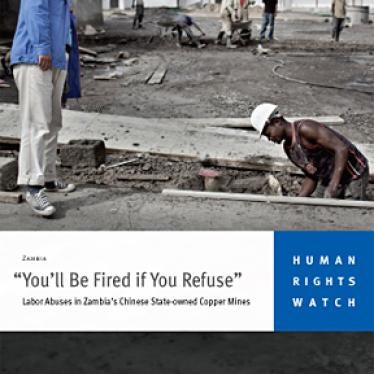(New York) – Prospective investors in China Non-Ferrous Metals Mining Corporation’s (CNMC) upcoming initial public offering (IPO) in Hong Kong should be aware of the company’s disturbing labor rights practices in Zambia. CNMC’s inability or unwillingness to respect worker’s rights in their Zambia operations raises critical questions about corporate behavior that potential investors should direct to the company, Human Rights Watch said.
Reuters and Hong Kong’s Ming Pao newspaper reported on April 17, 2012, that the Chinese state-owned CNMC would publicly list its Zambian copper mining assets – including underground mines, a smelter, and processing plants – on the Hong Kong Stock Exchange. CNMC is set to begin an investment “road show” as soon as this week to attract potential international investors.
“Potential investors in CNMC’s IPO should know that there remain grave failings in the labor practices at the company’s copper mines in Zambia, particularly poor safety practices that have led to avoidable accidents,” said Arvind Ganesan, business and human rights director at Human Rights Watch. “Ensuring workers rights and respecting local and international laws are essential components of good and sustainable corporate behavior.”
Human Rights Watch documented persistent labor abuses in CNMC’s Zambia operations in a November 2011 report, “‘You’ll Be Fired if You Refuse’: Labor Abuses in Zambia’s Chinese State-owned Copper Mines.” CNMC’s miners describedserious problems with health and safety conditions, long hours of work involving arduous labor, and anti-union activities. In a November 23, 2011 letter to the Hong Kong Exchanges and Clearing Limited (HKEx), Human Rights Watch shared concerns about CNMC’s poor labor practices in Zambia.
The Human Rights Watch report was based on more than 170 interviews, including 95 interviews with copper miners in the four CNMC-run companies in Zambia. Findings include:
- Threats by Chinese managers against Zambian workers who did not want to continue with work that they reasonably believed to be unsafe;
- Bribery and threats by company officials toward workers who had suffered minor work injuries, preventing legally required reporting of such accidents;
- Long hours of work at Sino-Metals and, to a lesser degree, Chambishi Copper Smelter (CCS), that appeared to violate Zambian and international law; and
- The suppression of workers’ rights to establish and join the unions of their choice at Sino Metals and CCS, with workers describing threats that they would be fired if they tried to file papers to establish a Mineworkers Union of Zambia (MUZ) branch office. National union leaders said both companies have defied court judgments to allow the workers to be unionized by MUZ.
“CNMC’s flouting of local and international labor and safety standards should be a red flag for potential investors in Zambia’s copper sector,” Ganesan said. “CNMC needs to address the poor working conditions and unfair labor practices in its Zambian mining operations.”
Following the release of Human Rights Watch’s report, Zambian government ministers as well as national union officials repeatedly affirmed the abuses documented. Zambia’s labor minister at the time, Fackson Shamenda, said that the “government is ready to work with the Chinese but they should stop flouting labor laws and ensure that all workers are properly looked after.”
In early February, Zambia’s mines minister told media outlets that he had recently visited some of the Chinese-owned mines and found unsafe operations. He said that he would demand improvements in mine safety from Chinese mine managers and was quoted by media reports as saying, “Some methods aren't up to accepted practices. If they don’t improve we may be forced to take their [the miners’] licenses.”
Prior to the report’s publication, Human Rights Watch sent CNMC a summary of the main findings. In a detailed response, CNMC denied certain findings but admitted having some labor problems. It said that its main underground mine, NFCA, had been “subject to repeated criticisms from Zambia government departments including the tax department, audit department, mining department and safety department.”CNMC promised to “conduct more detailed, comprehensive, and in-depth investigations, focusing on the issues that you have raised, or have yet to raise.”
In spite of these commitments, the company and the Chinese Foreign Ministry issued denials after the report’s release, calling the findings “untrue.” Human Rights Watch formally requested meetings to discuss the report’s findings and recommendations with high-level Chinese managers at CNMC’s underground mine operations, China’s ambassador in Lusaka, and officials from the Zambia-China Cooperation Zone. However, these officials refused to meet with Human Rights Watch.
CNMC began investment in Zambia in 1998 and has expanded its four copper mining operations over the last decade, employing more than 6,000 workers at present in these companies. Workers interviewed by Human Rights Watch regularly highlighted abusive working conditions that have led to frequent strikes and other labor disturbances, even while they expressed appreciation for the jobs that CNMC’s investment provides.
“CNMC’s large investment in Zambia offers much-needed jobs and revenue to the country, but that shouldn’t come at the expense of human rights,” Ganesan said. “This IPO allows potential investors to make that point to CNMC and gives the company a chance to prove it intends to do the right thing.”







